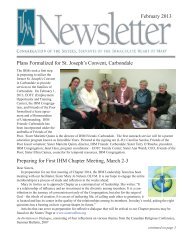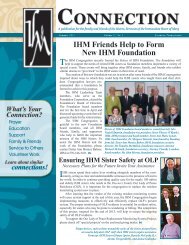Journey - Congregation of the Sisters, Servants of the Immaculate ...
Journey - Congregation of the Sisters, Servants of the Immaculate ...
Journey - Congregation of the Sisters, Servants of the Immaculate ...
Create successful ePaper yourself
Turn your PDF publications into a flip-book with our unique Google optimized e-Paper software.
page 10<br />
<strong>Journey</strong><br />
Fall 2012<br />
A Courageous Heart —<br />
“Come back and practice your<br />
writing lesson.” “We want to<br />
play; we’re having so much fun.”<br />
“Kaze (KAH-zeh) come back this<br />
instant and get to your studies or<br />
I’ll cut <strong>of</strong>f your braids,” shouted<br />
seventeen-year-old Anthony,<br />
her seminarian bro<strong>the</strong>r. Kaze<br />
responded, “Catch us if you can!”<br />
Tug, snip—<strong>the</strong> horrified eightyear<br />
old looked down at her brown<br />
braid lying forlorn on <strong>the</strong> ground.<br />
Sobbing in her mo<strong>the</strong>r’s arms, she<br />
was consoled that <strong>the</strong> hair would<br />
grow back quickly. Still sniffling,<br />
Kaze mulled over <strong>the</strong> incident<br />
and resolved to be faithful to her<br />
studies. This fun-loving girl grew<br />
up to be a very courageous and<br />
holy woman.<br />
Casimira Kaupas (nicknamed<br />
Kaze) was born in Gudeliai,<br />
Lithuania in 1880. Her fa<strong>the</strong>r, a<br />
leader in <strong>the</strong> village, allowed his<br />
home to be <strong>the</strong> center for Sunday<br />
common prayer and a secure<br />
stopover for “book smugglers,”<br />
men who secretly carried<br />
manuscripts to and from Germany<br />
for printing in <strong>the</strong> forbidden<br />
Lithuanian language. To be<br />
caught as part <strong>of</strong> this movement<br />
would be instant imprisonment by<br />
<strong>the</strong> Russian Cossacks. Kaze loved<br />
her fa<strong>the</strong>r deeply and resolved to<br />
imitate his virtuous prayerful life.<br />
From his example she was imbued<br />
with a fidelity to prayer and<br />
courage to hold to what is right.<br />
At age fifteen, her calm<br />
and peaceful life was greatly<br />
disturbed when Anthony, now<br />
a priest and ministering to <strong>the</strong><br />
many Lithuanian immigrants in<br />
Scranton, PA, wrote asking that<br />
Casimira be allowed to come<br />
as his housekeeper. She was<br />
deeply attached to her<br />
family and so her heart was<br />
terrified. None<strong>the</strong>less, she<br />
conformed to her parents’<br />
wishes and outwardly<br />
displayed courage so as<br />
not to <strong>of</strong>fend her loved<br />
ones. Her troubled heart<br />
sought solace in prayer, seeking<br />
<strong>the</strong> strength to leave her family<br />
and face <strong>the</strong> awesome voyage to<br />
America— alone.<br />
In May 1897, seventeen-yearold<br />
Casimira began <strong>the</strong> harrowing<br />
journey as she traveled by train at<br />
night and <strong>the</strong>n by day concealed<br />
under a canvas on a wagon filled<br />
with grain bags. The Czarist<br />
government, <strong>the</strong>n governing<br />
Lithuania, forbade <strong>the</strong> youth to<br />
leave <strong>the</strong> country and so she had<br />
to be smuggled out. She and<br />
a few o<strong>the</strong>r escapees were led<br />
by men who were paid to bring<br />
<strong>the</strong>m safely across <strong>the</strong> border<br />
into Germany. While climbing<br />
a high bank someone screamed<br />
and <strong>the</strong> men took <strong>of</strong>f without<br />
her. She ran breathlessly to catch<br />
up. When she did, she found<br />
out that <strong>the</strong>y had successfully<br />
crossed <strong>the</strong> border and were soon<br />
met by an armed guard. She<br />
was experiencing <strong>the</strong> fate <strong>of</strong><br />
immigrants even as some <strong>of</strong> <strong>the</strong>m<br />
do today.<br />
Casimira remained for four<br />
years as Fa<strong>the</strong>r Anthony’s<br />
housekeeper but was forever<br />
homesick. Her fa<strong>the</strong>r passed away<br />
and she longed for her mo<strong>the</strong>r’s<br />
companionship. Her prayer life<br />
grew strong through <strong>the</strong> depth <strong>of</strong><br />
her spiritual reading, but her heart<br />
remained lonely. One day while<br />
on <strong>the</strong> streetcar she saw sisters for<br />
<strong>the</strong> first time in her life. She asked<br />
her bro<strong>the</strong>r with great interest who<br />
<strong>the</strong>y were, to which he responded<br />
that <strong>the</strong>y were women who lived<br />
for God alone. Here was <strong>the</strong><br />
answer to her continuous search<br />
for meaning to her life. When<br />
she expressed interest in joining<br />
<strong>the</strong> convent her bro<strong>the</strong>r tried to<br />
dissuade her by buying her lovely<br />
clo<strong>the</strong>s, but Casimira remained<br />
focused and knew she would never<br />
regret giving up anything.<br />
To her bro<strong>the</strong>r’s<br />
disappointment, Casimira did<br />
return to Lithuania. While <strong>the</strong>re<br />
she finally resolved to return<br />
to <strong>the</strong> United States and enter<br />
a convent. Meanwhile <strong>the</strong><br />
Pennsylvania Lithuanian<br />
Priests’ League decided <strong>the</strong>y<br />
would build schools if <strong>the</strong>y<br />
had Lithuanian sisters, for it<br />
was <strong>the</strong> only way to help <strong>the</strong><br />
immigrants preserve <strong>the</strong>ir<br />
faith and culture. Casimira’s<br />
name came up and Fa<strong>the</strong>r<br />
Anthony wrote asking if<br />
she would be <strong>the</strong> foundress<br />
<strong>of</strong> this new congregation.<br />
She heartily agreed and<br />
her bro<strong>the</strong>r sent her to<br />
Switzerland to study. Here<br />
many challenges surrounded<br />
her daily: loneliness, learning<br />
<strong>the</strong> German language, and<br />
learning to live <strong>the</strong> life <strong>of</strong> a<br />
religious. The source and<br />
strength <strong>of</strong> this courageous<br />
heart was found in her great<br />
love for <strong>the</strong> Lord, her dearest<br />
Friend.<br />
Arrangements were<br />
made for her and her two<br />
companions for fur<strong>the</strong>r<br />
religious studies in<br />
America. Mo<strong>the</strong>r M. Cyril,<br />
IHM, welcomed <strong>the</strong>m to<br />
Marywood in Scranton. In<br />
Casimira’s autobiography<br />
she wrote that she, “was<br />
familiar with Scranton and<br />
had occasionally seen those<br />
sisters from a distance.” It was<br />
<strong>the</strong>ir very example that drew<br />
her to <strong>the</strong> convent. With <strong>the</strong><br />
greatest joy she thanked Divine<br />
Providence; she was going, as<br />
it were, to her true home.<br />
With joy Casimira, in 1907,<br />
pr<strong>of</strong>essed her vows as Sister Maria<br />
in <strong>the</strong> new congregation, <strong>the</strong><br />
<strong>Sisters</strong> <strong>of</strong> St. Casimir. The <strong>Sisters</strong>,<br />
<strong>Servants</strong> <strong>of</strong> <strong>the</strong> <strong>Immaculate</strong><br />
Heart <strong>of</strong> Mary (IHM) guided <strong>the</strong><br />
fledgling community until 1913<br />
when Sister Maria was elected <strong>the</strong><br />
superior general. The friendship<br />
between Mo<strong>the</strong>r M. Cyril, IHM<br />
and Mo<strong>the</strong>r Maria matured and<br />
deepened throughout <strong>the</strong>ir lives.<br />
The following years were<br />
both blessed and challenging for<br />
Mo<strong>the</strong>r Maria as her congregation<br />
Sister Margaret Petcavage<br />
presenting <strong>the</strong> “Positio” to<br />
Oblate School <strong>of</strong> Theology<br />
president, Rev. Ron Rolheiser,<br />
OMI, and San Antonio<br />
Archbishop Gustavo Garcia<br />
Siller, MSpS.<br />
grew and schools and<br />
hospitals were staffed.<br />
In 1920 <strong>the</strong> Bishops<br />
<strong>of</strong> Lithuania, now<br />
experiencing freedom<br />
from Czarist rule, invited<br />
Mo<strong>the</strong>r to return to her<br />
homeland to establish<br />
Mo<strong>the</strong>r Maria



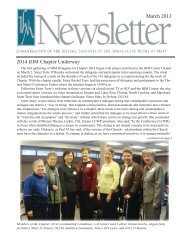
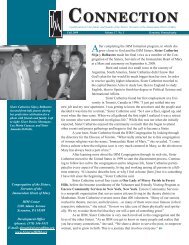
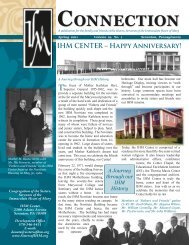

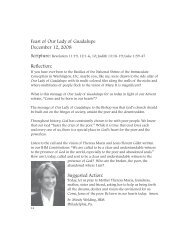

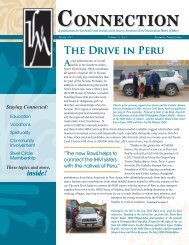
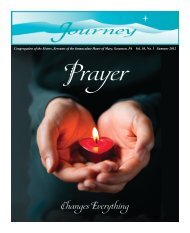
![Sr Terry PPT NatMig July 2013 [Compatibility Mode] - Congregation ...](https://img.yumpu.com/33585722/1/190x135/sr-terry-ppt-natmig-july-2013-compatibility-mode-congregation-.jpg?quality=85)
